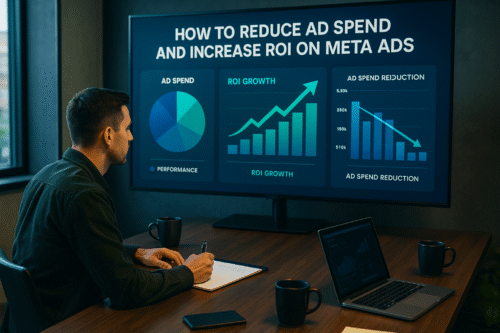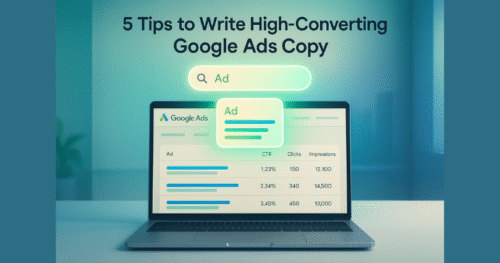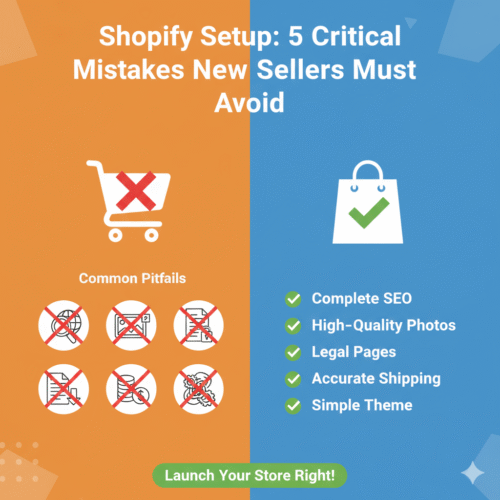Google Ads may seem easy at first glance. You choose words, write ads, decide on an amount to spend, and start. But if you’ve tried it, you know that good Google Ads plans need careful thought, constant work, and expert attention. That’s where online ad groups come in. They use their know-how, data, and systems to get businesses the most from their ad money.
In this blog, we’ll explain how online ad groups handle Google Ads plans, from beginning to end.
1. Understanding Your Business & Setting Clear Goals
A decent agency will always start by getting to know your business before starting any Google Ads campaign. They’ll check out what you sell, who your customers are, who you’re up against, and what makes you special. This way, they can figure out the best way to bring you value. This also means setting clear, measurable goals early on, such as getting more leads, selling more online, getting more calls, or making your brand more visible. Turning these goals into numbers like cost per lead, conversion rate, and ad spend return gives agencies a good place to begin. When you know what you want from the start, every choice you make for the project is more planned and works out better.
2. Keyword Research & Competitor Analysis
To manage Google Ads well, it begins with good keyword research. Marketing firms look at keywords that show what people really want, are longer, and are also negative keywords. This helps them create a specific list that brings in the visitors you want while saving money. These companies use instruments, such as Google Keyword Planner, SEMrush, and Ahrefs, to search for words that match what your customers search for. Too, these firms look at your rivals to see what search words they use, what ads they show, and how their landing pages look. Knowing what your competitors do helps make your plan better, find opportunities, and keep your ads competitive.
3. Crafting High-Converting Ad Copy
Making good Google Ads means more than just having catchy text. It means knowing what people want and giving them the right info when they need it. Ad firms create several versions of ad text that are clear, show value, and have strong calls to action. They show the good things about the product, what makes it special, any deals, and reasons to trust the brand so the ad stands out. By checking different titles, descriptions, and extensions, they see what works best. This plan helps get more clicks, makes the ad more relevant, and gets better results for less money.
4. Creating Optimized Landing Pages
Even stellar ads can flop if the landing page isn’t up to par. That’s why agencies craft landing pages with conversion in mind. They focus on headlines that are easy to get, content that shows the good stuff, fast loading, and phone-friendliness. Things like trust badges, customer reviews, nice pictures, and a clear call to action can get people to convert. Agencies also do A/B tests, trying out different layouts, forms, and messages to see what gets the best results. When the page is what the ad said it would be, conversion rates go up, and you don’t waste money on ads.
5. Setting Up Campaign Structure
Good Google Ads management starts with a well-planned campaign. Agencies usually arrange campaigns based on goals, products, services, or who they’re trying to reach, which helps keep things clear and organized. They create focused ad groups, pick the right keywords, and use the correct match types to get a better quality score. Each campaign uses extensions like sitelinks, callouts, and promotions to get more views and clicks. By having separate campaigns for branded terms, general terms, retargeting, and performance, agencies can spend their budget smarter and understand how each part is doing. This kind of structure makes it simpler to improve things and get better results over time.
6. Setting Conversion Tracking & Analytics
To have a winning Google Ads campaign, you need to track things right. Agencies usually set up conversion tracking using Google Tag Manager, GA4, and Google Ads. This way, they can keep an eye on what people do, like when they fill out forms, make calls, buy stuff, or click buttons. They also set up better conversions, use UTM parameters, and connect CRM data to see how good the leads are, not just how many there are. With the right info, agencies can tell which keywords, ads, and audiences are actually working. This helps them cut out the stuff that’s a waste of money, fix and improve the stuff that’s doing well, and make better choices that boost ROI.
7. Smart Bidding & Budget Management
To get the best bang for their buck, agencies use smart bidding. They’ll pick strategies like Target CPA or Maximize Conversions, depending on what you’re trying to achieve. This helps them balance how much they spend with how well they’re doing. They keep a close watch on where your money goes each day and make sure it’s going to the campaigns, keywords, and audiences that are working well. They also tweak bids based on things like what device someone is using, where they are, when they’re searching, and how they act. This constant tuning cuts down on wasted money and boosts your return. The goal is straightforward: put money where it works, and stop spending where it doesn’t.
8. Building Custom Audiences
Getting your Google Ads in front of the right folks is super important these days. Agencies do this by checking out what people do online, what they search for, and how they act on websites.
For example, they make lists of people who’ve already visited important pages, left stuff in their online shopping carts, or checked out your content. They also make groups of people who are similar to your best customers. Plus, they find people who are already looking to buy stuff like what you sell.
By mixing and matching these groups, agencies can target ads better, waste less money on clicks from people who aren’t interested, and get more sales from the people who are likely to buy.
9. Daily, Weekly & Monthly Optimization
To keep Google Ads doing well, you have to keep fixing it up. Ad agencies keep an eye on things like how much money is being spent, what people are searching for, and if anything suddenly changes. Each week, they make things better by stopping keywords that aren’t doing well, adding new ones, trying out different ads, and changing how much they bid.
Then, each month, they look at the bigger picture. They check how things are going over time, see if the conversions are good, make the landing pages better, and do more of what’s working. This way, small issues get fixed fast, bigger changes happen on a regular basis, and the overall plan stays on track. If you keep making things better, your ads will keep doing well, and you’ll get more for your money.
10. Transparent Reporting & Strategy Meetings
With clear reports, you’re always in the loop about how your Google Ads are doing. Agencies usually send out monthly reports that show you the important stuff, like how much was spent, clicks, conversions, CPL, and ROAS. They’ll tell you what went well, what didn’t, and how the money was used. After you get the report, there’s a meeting to talk about the results. The agency will explain what’s happening and what the next steps are to make things better. This way, you know exactly how your ad money is working for you, and everyone’s on the same page. When things are clear, you can make smart choices based on facts, and the plans for the future are better and fit what your business needs.
Why Companies Choose Agencies to Run Their Google Ads
Here’s why businesses often go with agencies instead of handling Google Ads themselves:
1. Expertise Across Industries
Agencies work with tons of different accounts, so they’ve seen it all and know what actually works.
2. Better Tools & Analytics
Agencies use fancy tools to do research, keep track of how things are going, and make ads even better.
3. Time-Saving
Running ads takes a lot of time each week. Agencies take care of that for you.
4. Higher ROI
Good setup, good info, and good calls that equal more bang for your buck.
5. Reduced Mistakes
Messing up settings can waste a lot of money fast. Agencies stop that from happening.
Final Thoughts
Handling Google Ads might seem simple, but getting good results takes skill, knowing your data, and always trying to improve. That’s why businesses trust agencies with their online ads. Agencies have a plan for everything, from figuring out what people are searching for to making reports. They work hard to get the best results without spending too much money.
If you want expert help expanding your business globally, explore our complete range of digital marketing services:







